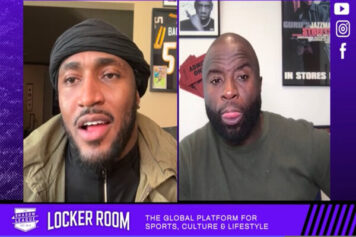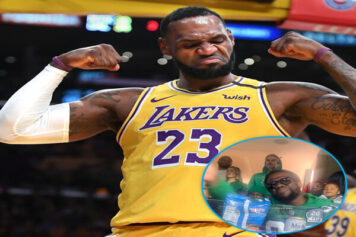There are a relatively small number of people on the planet who have as much authority to discuss the game of basketball like CBS NCAA Men’s Basketball Analyst Len Elmore. The Shadow League was in attendance at the TNT and CBS NCAA Tournament press event in New York City at the Hilton, canvassing the room of basketball minds for juicy soundbites and quotes.

(Photo Credit: University of Maryland)
We spoke with Elmore last year before the tournament and he imparted some valuable nuggets about the state of the back-to-the-basket centers and power forwards that ruled the game in days of old. Here’s what he had to say yesterday about rating this years field of college basketball players, the Steph Curry conundrum, the dearth of sports activists and how the debate between then and now is all about ownership.
The Shadow League: Why do you feel the NCAA Mens Basketball Tournament is so popular?
Len Elmore: I think its the lack of predictability. Its the irresistible force meeting an immovable object. Its the fallibility of young men versus the ability of young men to rise to the occasion. When those two things meet, you get the upsets and the intrigue that is March Madness.
TSL: Who do you have advancing to the Final Four?
Elmore: I wish I brought my notes with me. Every year I try to do something a little more systematic. This year Im taking a look at putting teams that I considered favorites into different categories; muscle teams, finesse teams and tweeners. Id like to wait for the conference tournaments to pan out and how theyre affected by the new rules, etc.
Are the muscle teams still going to be able to survive? These are teams like the Michigan State Spartans and West Virginia. Or will it be the finesse teams? Teams like Virginia, Villanova, Oklahoma, teams like that. Or even the tweeners, teams that can play both types of game? Well see which groups of those fare better in the conference tournaments. Then, well be better able to predict what teams are going to make it to the Elite Eight or the Final Four.
TSL: At one point, it would have been unheard of for the Metro Atlantic Athletic Conference (MAAC) to get two tournament bids, but Iona got the automatic bid and Monmouth University might get an at-large bid after playing a robust schedule. What does that say about parity?
Elmore: I think its great. It all comes down to the willingness of those bigger schools to play the smaller schools. Those out-of-conference schools had to agree to play Monmouth and give them a chance to show people what theyve got early. If people didnt give Monmouth that chance, then they may not be (considered) for an at-large bid.
I think its wonderful. Thats part of the diversity of college sports. People say theres no parity. Some of my colleagues have said that parity is an empty word, but I dont believe that. Talent has been distributed more evenly now than at any time in the history of the game.
I think its great for college basketball, keeps the fans involved, and it helps fuel the intrigue that pops up every time March Madness comes around.
TSL: You and I discussed big men in the game at length last year, and how the game is moving away from them. The modern era is ruled by Steph Curry and perimeter players. Do you believe he is as good, or mediocre when compared to other greats, as some have said he is?
Elmore: Its context. Every great player was great within the context of their game because of rules and the evolution of players. Would some of the great defenders from back in the day have been able to check Curry? Probably, being able to hand check. But Stephen Currys handle is so good he may have been able to escape that. We dont know.
Would he be pulling up back then like he is now? Back in those days there was no three-point line. Why would he take a 30-footer instead of coming closer to the basket and creating a 15 footer? That goes to your point about some of the great shooters who didnt take long-range shots basically because it didnt make sense within that context of the game.
I think we should learn to appreciate players within the context of their game and stop trying to transcend them. What youll ultimately find out is its all about ownership.
A lot of old-school people still want to own greatness, and kids today want to own greatness. They want it to be from their era. Thats where the conflict lies, whos going to own the moment? I say lets be smart about it. There arent many transcendent players. Maybe a Michael Jordan, maybe a Wilt Chamberlain or a Bill Russell or Oscar Robertson, but very few guys are transcendent. Most guys are great within their context.
TSL: What is an aspect in or around the game of basketball that you’d like to see more of?
Elmore: Social activism among athletes, I think its very important for them to use their platform to take a stand. I dont ever want to hear Republicans buy shoes too ever again. I grew up during a time when the government was chastising Muhammad Ali and Jim Brown, Kareem Abdul Jabbar, Bill Russell, and people like that gathering to make a collective statement. Thats the era in which I grew up. They had positive influence. I am hopeful that we can find that moment again.
TSL: LeBron James has stepped up on many occasions but recently caught flak for not doing so in the Tamir Rice shooting, which took place in Cleveland. He cant do it all, can he?
Elmore: To whom much is given much is expected. He could have (stepped out there). Thats leadership. Leadership isnt coming with a collective. Leadership is stepping out in front and beckoning people to come with you.



